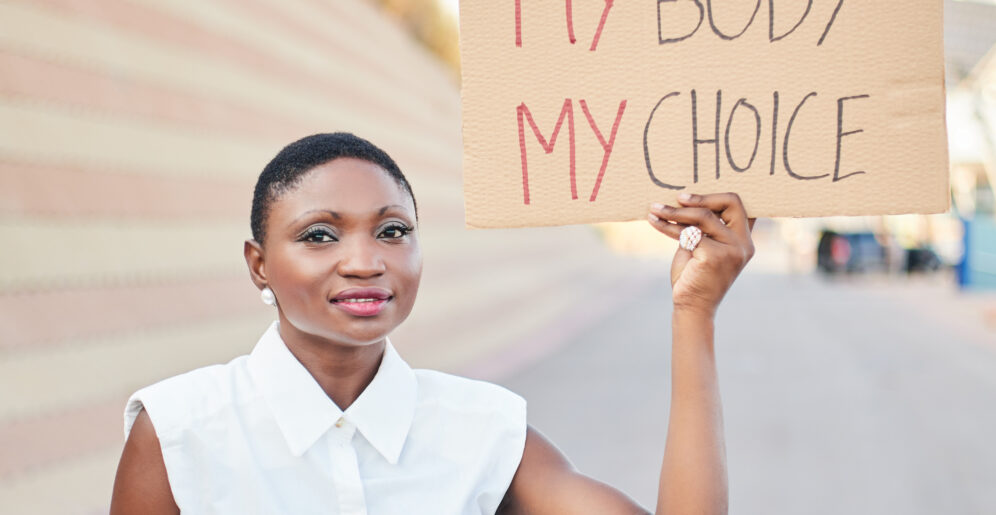
Body Politics
Resisting Motherhood When There’s A War On The Black Womb
If there’s one decision I’ve grown to accept upon entering my 30s, it’s that I’m not having children. Politics, declining health and financial resources and intensified gender wars have made it perilous to start a family.
Many women who’ve chosen to go child-free have heard the same egoic, although well-intended, sentiments: “You’ll change your mind,” “Children are a blessing,” or my favorite feigned concern, “Don’t you want someone to take care of you when you’re older?” But when I once ran into a former high school classmate who’d given birth just three years before, her warning rang louder than any encouragement of motherhood that I’ve heard: “Don’t have kids.”
At the time, I’d spent five years on birth control–specifically the implant–but the societal and familial expectation of eventually having children almost blinded me to the harsh realities of Black motherhood. Coming from a small Midwestern town, seeing friends and acquaintances become parents up close and afar gave me a clearer perspective on living child-free. Firsthand stories I’ve heard about co-parenting make the arrangement seem hopeless–the parents’ relationship can be drastically altered when another human comes into the fray. Time and money for oneself are limited when a child depends on you, and by no means are they at fault; the responsibility just comes with the territory. And support systems aren’t promised; family members and those who you thought were your trusted circle may evade helping with childcare, turning motherhood into isolation.
Women who want children aren’t wrong for wanting to do so; it’s a wholesome and fulfilling experience, particularly when a village is involved. While ‘it takes a man to raise a man’ has been battered into public consciousness, it couldn’t be further from true–all youths can be nurtured in women-centric environments when empathy, knowledge and unconditional love are instilled. Moreover, choosing to become a mother makes it all the more necessary to meditate on reasons for doing so, but in a climate where the consequences of Black maternity are largely hostile treatment, intentionally guarding my womb has been a safer choice.
It’s well known that expectant Black mothers suffer mortality rates three to four times higher than white women, but as of late, maternal deaths have been much too frequent to be overlooked. In February, Georgia woman Adriana Smith was early in her pregnancy when her ongoing headaches worsened to neurological blood clots, and, after having a stroke, caused her to be declared brain-dead. The circumstances were a medical nightmare that Smith’s family could wake up from; because of “compliance with Georgia’s abortion laws,” the 31-year-old woman was kept on life support for her child to be delivered, the infant being extremely premature upon their birth in June. By then, Smith, who was forced into a state of incubation, was deceased.
Smith’s untimely death wouldn’t have occurred if it weren’t for the malicious overturning of Roe v. Wade in 2022, widely banning the constitutional right to an abortion. Although the decision was justified as returning to our nation’s ‘morals,’ the legal elimination is a veiled attempt at castigating sexually active women and birthing people, mainly those who aren’t ready for parenthood. There are greater restrictions in states occupied by large Black populations, as those without a college degree, unable to travel and deficient in financial means are most targeted. But when single-parent Black families face higher threats of food insecurity, there’s barely time to look into pregnancy prevention when mothers are worried about where their children’s next meal is coming from.
Seeking preventative measures has been just as impossible with limited birth control access and disinformation about contraceptive methods. Under the current presidential administration, which has caused an irrepressible conservative agenda, women are being pressured into motherhood before even having clarity on the future they envision for themselves.
The same right-wing values are being spewed online by men disseminating incel or red-pill ideologies that exacerbate harmful beliefs about womanhood and feminism. These same men often share their hopes for fatherhood, which is cause for concern when their toxic behavior can perpetuate how women are mistreated. I’ve come to have little faith that these habits will be atoned for when misogynistic phrases like “Your body, my choice” are rampant on social media and go unchecked.
Apart from societal risks, abruptly ended relationships between ill-prepared co-parents can cause a strain that can’t be undone and negatively impacts observant children. This isn’t to say that marriage is necessary to demonstrate ethical relationships between co-parents, but commitment helps in dodging fathers who are unintentional about partnership and childrearing. As aforementioned, I don’t come into this conversation as a mother but as a child of two parents who struggled in meeting their expectations for each other and thus, have avoided speaking for as long as I’ve been alive, influencing how much I refuse to continue the cycle.
With there being a global decline of pregnancies, Black women are already taking heed of their well-being and giving childbirth more thought. And really, it should be on our terms, not through the toils of conforming when we’re simultaneously disenfranchised. Recently, my mom has jokingly pestered me about wanting to be a grandmother and says that my worries are fear-based. But to me, they’re rooted in truth and my point stands: Reproductive justice is under attack, and opting to be child-free can be just as radical as motherhood.
Get The Latest
Signup for the AFROPUNK newsletter